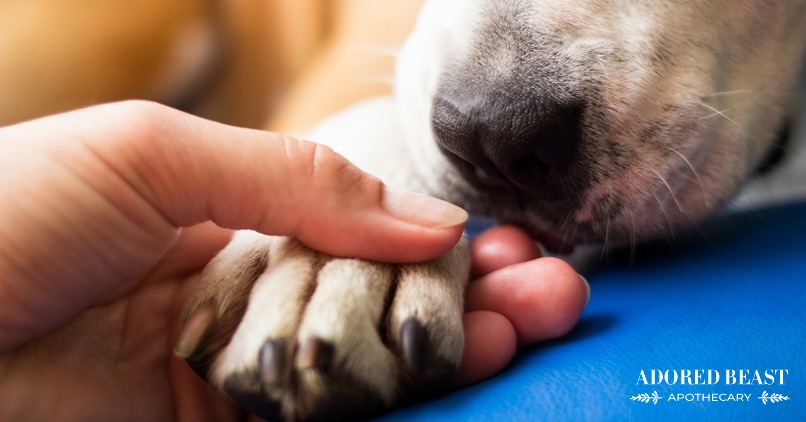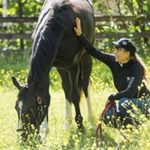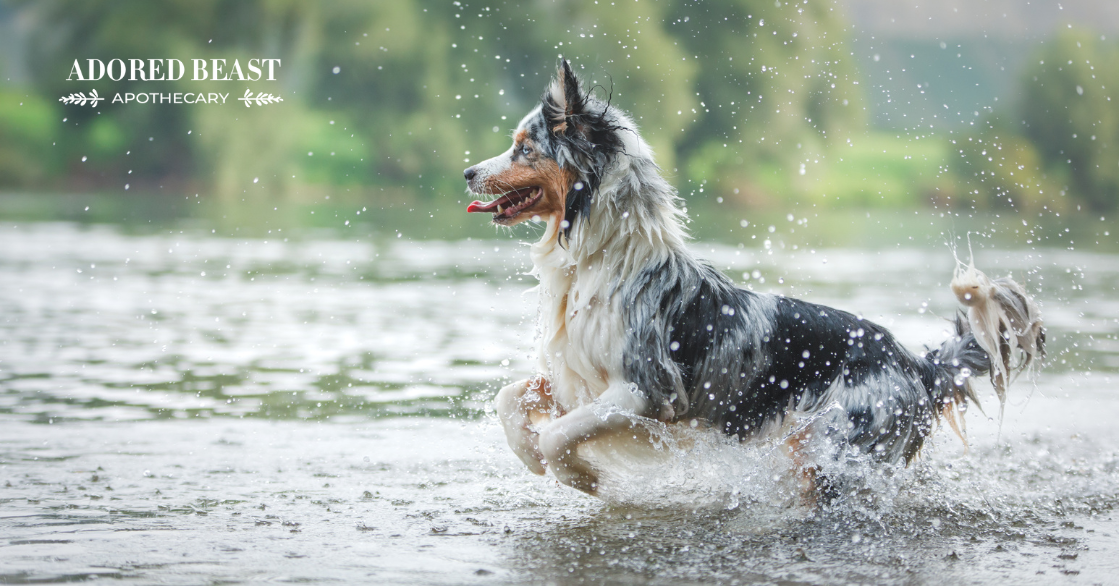When your animal isn’t feeling well, do you go into fight or flight mode? Do you make decisions out of fear or with presence? Your anxiety could be putting your pet’s health at risk… and yours! It can also have environmental impacts. Let’s talk about a hard subject: reactive vs. perceptive animal care.
We all know that feeling when our animals get sick or hurt. It’s a terrible and stressful thing. We want our animals to feel 100% all of the time. But, as most of you know, you’re probably going to encounter some bumps in the road over their lifetime. How we navigate through these hard times can either prevent future illness or promote it. This blog is about human presence when it comes to helping our pets out of a health crisis.
When human beings enter into a relationship with an animal, we are the ones choosing to invite a living being into our world. We become their guardians and providers and we have to make decisions for them to keep them healthy and safe. When we let our human emotions get in the way, it can make it very hard to see the forest for the trees….
How to Navigate our Human Emotions in the Midst of our Animal’s Health Crisis
Human psychology is a rather complicated subject. We seem to be a lot more neurotic than our animal friends. Anxiety disorders are on the rise and with the COVID-19 pandemic underway for over a year now, our fragile human psyches can get into some pretty strange states. If the pandemic has taught us anything, it’s how to be more present. But there’s something else that can teach us even better about presence: our animals.
What is presence?
Presence, in physical terms means that you are “in attendance with people or a place.” But presence can also refer to where you are in your mind. Humans are extremely intelligent creatures with large brains but we also have large emotions and wild imaginations that allow us to mentally travel backwards in time and forwards into the future. When our minds are thinking to the past or to future possibilities, we step out of the mental space of presence.
Animals are extremely adept at living in the present moment.
I come from a background working with horses. Equines are large, powerful animals that flee in the midst of danger. To learn to be safe around them and not get hurt, you need to become 100% present. If I was thinking about what I had for dinner last Tuesday or worrying about losing my job next week, I could miss the ear flick, the widening eye or the tail swish and be off-guard if my horse gets scared and moves fast. I could be standing in the wrong place at the wrong time and get stepped on or worse. In order to read a horse, you cannot be living in the past or the future. Every second you are with them, you need to be fully with them. If you’re not in that space, not only does it put you in danger, but it also puts your horse at risk for injury and may cause them not to trust you in scary situations. It can be a very negative feedback loop of fear for the horse.
Humans? We’re Not so Good at Controlling our Stress…
So now let’s talk about human stress. Human anxiety generally stems from a place of feeling out of control. Take COVID-19 for example. How much more out of control could we be? This is causing a great deal of anxiety for many, especially those losing their livelihoods or those who live in isolation. Compound that with our human egos and we can get pretty stressed out. Anxiety can happen in appropriate situations like a car accident or a fall. But the same adrenalin-filled state can literally happen when we worry about the future or think about stressful events from the past. The causes is to go into the famous “fight or flight” mode of existence. The worst example is post-traumatic stress disorder (PTSD).
And wouldn’t you know but who comes to the rescue in a significant way when it comes to recovering from PTSD? It’s the animals. Studies show that animals teach humans the power of presence in a very effective way. Also, watch this heartwarming video of how wild horses help to rehabilitate high risk offending criminals in the USA.
What is Fight or Flight?
When animals get scared and go into fight or flight mode, they literally run away or fight with another who is posing a threat to them. With this, the hormones adrenalin and cortisol are secreted into the bloodstream to give them snappy reactions that may be the difference between life and death. In real-life dangerous situations, this is a wonderful survival tool. Be we humans are able to take ourselves into this state purely in our minds. But our bodies don’t actually know that it’s not real! We can literally be sitting in a chair thinking about something and go into fight or flight. With us, it’s not always in response to real physical and present danger.
So why the heck am I going on about this? Well, one of the major stressors that I see is when pet parents experience a health crisis with their pet. We all do it. We kind of lose our minds. And we go into fight or flight. We can’t stand to see our pets suffer and then we start getting ahead of ourselves, thinking the worst case scenario even though it hasn’t happened yet. And then we step into the future and lose our presence. When we get stressed, we start to react. We don’t think logically. We act out of fear.
Our animals feel our stress…
Science confirms what some of us long-time animal parents already know. Our fear, stress and anxiety is felt strongly by our pets and even causes changes in their stress hormones. Chronic stress can also affect our health in a number of different ways including our gut, heart, nervous system, endocrine system, our cognitive abilities and more. And when we are stressed, it can affect our animals profoundly. So, it’s totally worth learning how to check your stress levels, for your own health and the health of your pet.
Reactions Vs. Decisions
We’ve all been in a situation where our animal has needed veterinary assistance. It can be pretty stressful. But this is when they need us to be the strongest. We need to be there to advocate for them and do what we think is best. Sometimes we go down the road of thinking we should throw every drug in the book at them to make them feel better but it doesn’t always work out for the best, in terms of long-term health: This is what I mean by reactive animal care.
Take antibiotics, for example. They are a valuable tool but they have been so overprescribed that it’s causing serious health and environmental problems. Not only do they damage the gut microbiome but they also cause antibiotic resistance in both animals and people all over the world. Over 700, 000 people die every year around the world due to antibiotic resistant infections. The World Health Organization has even published a statement pleading with doctors and veterinarians to stop unnecessarily prescribing antibiotic drugs. Antibiotics are being prescribed every day with no diagnosis or proof of bacterial-related illnesses. Again, this would be considered REACTIVE treatment rather than science-based medicine.
This is where you need to have presence in the midst of your animal’s illness. You need to be able to consider the long term effects of short term treatment. We all do it. We go into fight or flight and we want someone to tell us what we should do. We can get paralysed with fear over what might happen next. But you need to stay calm and present so you don’t end up on a health rollercoaster that you can’t get off of.
A common example of the negative effects of reactive animal care is repeated antibiotic treatment. Antibiotics can significantly affect your animal’s long term health. Metronidazole is the number one drug prescribed in veterinary practices across the world. hat is it prescribed for? Diarrhea. But this drug also severely damages the microbiome and is scientifically proven to cause dysbiosis (eg. leaky gut syndrome). And what does dysbiosis do? It causes chronic diarrhea. The worst part is that it’s common practice for vets to prescribe this drug with absolutely no proof of pathogenic bacterial infection. Furthermore, pathogenic bacteria can only grow in an unbalanced gut microbiome so throwing antibiotics at the problem is literally like throwing gas on a fire. And that’s why you need to stay calm to make good decisions for your animals.
Can you see where I’m going with this?
Let’s go back to the conversation about presence. When you can learn to recognize and assess your stress level, you are able to make logical decisions with foresight. When you let your emotions take over, you lose control of your ability to be rational in the present moment. A great scenario of this is when you see someone injure themselves in public. You may have seen a phenomenon where most people in the vicinity of the injured person become immobile and unable to respond to the emergency. But, sometimes, there that one person who springs into action and gets right down to helping them to get the help they need. This person might be called a hero and you’ll often hear them shrug it off and say, “I was just doing what needed to be done.” And they were able to do this by being present. No emotions, no drama, just a clear and concise ability to selflessly assess the situation and come to the aid of another. Be your animal’s hero!
Tips for Staying Present in Stressful Situations
- Educate yourself! Don’t just take someone else’s word for it. Educate yourself on the pros and cons of any treatment that you are considering with your pet. Don’t just rush into it.
- Connection with your animals. When it comes to your animals, you know them best. If you have a strong connection with them, you know way before the vet knows that the aren’t feeling well. And there’s so much you can do if you are present enough to notice these small changes before they become big changes.
- Keep a health journal. If your animal is dealing with a chronic illness, it really pays off to keep a journal so you can keep track of how they are doing over a longer period of time. You can really get ahead of flare-ups this way.
- Learn how to assess your animal’s immediate needs. You always have to look at the animal in front of you. I see animals that are very sick looking with little to no medical explanation. And, on the other hand, I see animals with diagnostic results that look incredible scary but, on observation, look happy and healthy. You need to stay calm in order to assess this in a logical manner.
- Learn to meditate. It might sound cheesy but meditation is now being accepted as a scientifically sound way to reduce anxiety in people, even by Harvard Medical School. Once you learn how to master this skill, you can use it in times of stress. This will not only reduce your anxiety and increase your ability make good decisions, it will massively benefit your animal when they aren’t feeling well. If they don’t have to feel your fear when they are sick, it is a huge advantage to helping them get well again. It will literally reduce cortisol levels for both of you!
- Find a vet and other health practitioners that support your decisions. It can be a lonely road when you chose the integrative health route. It is outside the box. It’s foreign to a lot of people and to a lot of doctors. So make sure you find experienced vets, doctors and other integrative practitioners that align with what you envision as a health and wellness plan for your animal. If you find yourself arguing with your vet on a regular basis, find a vet that aligns with your values. It can make all the difference in a health crisis. And it really reduces stress.
- Learn about preventative and alternative animal care. If you want to help your animal with alternative options, be sure to learn about them. Be a student of health and wellness for yourself and for your pets! Because health is literally wealth. The more options you have, the better your decisions can become.
I sincerely hope this article helps you to use awareness instead of anxiety to fuel the decisions you make for your animals and for yourself too!












